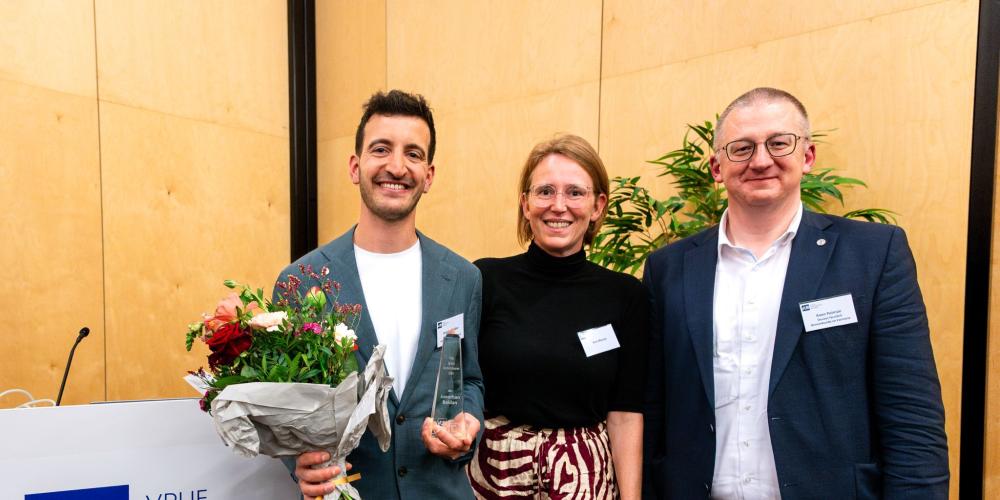
Jonathan Baldan, a researcher at the VUB campus in Jette, received the Vanderschueren Prize on April 24 for his PhD on pancreatic cancer. His research focuses on the origin of the disease—not when cancer is already rampant, but during the phase in which the first cellular errors occur. It is a story of scientific courage, personal motivation, and international impact.
Baldan’s journey began on a personal note, yet his drive extends beyond that: “Pancreatic cancer is one of the deadliest cancers. Average survival after diagnosis is around 4 to 6 months. I want to understand why that is and what we can do about it.”
His work led him to the lab of Prof. Luc Bouwens at VUB, where he studied the acinar cells of the pancreas. These cells normally produce digestive enzymes but can lose their identity under stress or inflammation and transform into an embryonic-like cell type. This process is called paligenosis and can be the first step toward pancreatic cancer.
Baldan’s research highlighted an unexpected key player in this process: the gene SOX4. This transcription factor was found to play a critical role in how cells respond to damage. He discovered that SOX4 is not only associated with malignant growth but can also have a protective role by maintaining cell structure. “SOX4 showed significant upregulation, indicating its involvement in pancreatic diseases,” says Baldan. “This justified further research.”
Further studies followed. Baldan went to Copenhagen for a postdoc at the Biotech Research and Innovation Center, where he demonstrated that SOX4 had an unexpectedly protective effect on pancreatic tissue in mice. These findings were recently accepted for publication in the top journal Gastroenterology, with an impact factor of 29.4—a remarkable recognition of his work.
The research didn’t stop at his PhD thesis. Insights from that work laid the foundation for a new project, now funded by the Stichting tegen Kanker. Titled Harnessing the proliferative regulation of its cells of origin to halt pancreatic cancer, the project investigates how the natural regeneration of pancreatic tissue can be guided without veering toward cancer. “I emphasized in my dissertation that the process of acinar cell proliferation must be studied in detail at the cellular and molecular level,” he says. “By uncovering new strategies to promote tissue homeostasis, these findings open possibilities for preventing pancreatic cancer.”
Tissue homeostasis is the body’s ability to maintain balance in its tissues. Old or damaged cells are replaced in time without producing too many or too few cells. It acts like a natural maintenance system ensuring everything functions properly. In the pancreas, tissue homeostasis allows damaged cells to repair themselves without uncontrolled growth, which could otherwise lead to diseases like cancer.
Baldan had already received international recognition for his work. He won a $100,000 U.S. research grant and was selected for a research stay at the prestigious CNIO in Madrid. “I hope to have shown that my PhD research has made—and will continue to make—a significant contribution to the evolution of pancreatic cancer research.”
No word is exaggerated here. Jonathan Baldan demonstrates the power of science when driven by both knowledge and commitment. The Vanderschueren Prize is a celebration of his work—and a starting point for what’s still to come.
More info:
Jonathan Baldan: jonathan.baldan@vub.be